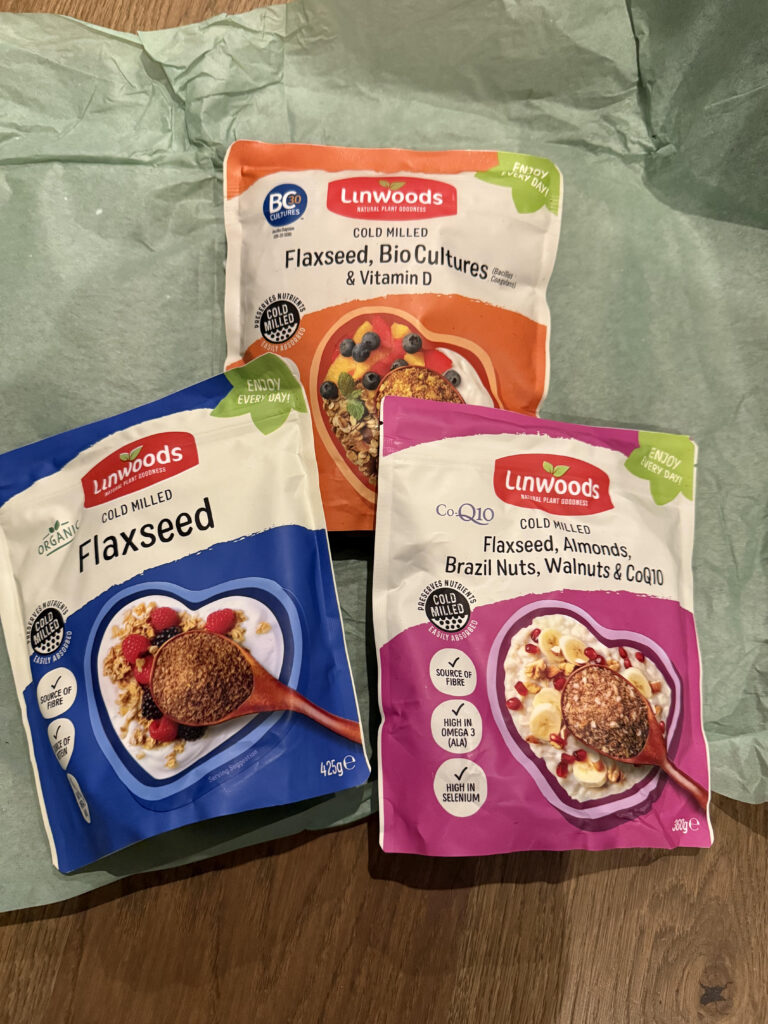| A natural solution for digestive issues? In this article, Jane McClenaghan, one of Northern Ireland’s most esteemed nutritionists with over two decades of experience, explores how these tiny seeds can support your gut. Jane, who runs Vital Nutrition and regularly contributes to media outlets such as the BBC and The Belfast Telegraph, explains the importance of flaxseeds’ fibre content, their prebiotic effects, and their role in maintaining a healthy gut microbiome. Through her expert insight, you’ll discover easy ways to incorporate flaxseeds into your diet and the science behind their digestive benefits. |
| How do flaxseeds improve digestion? Flaxseeds contain a lovely balance of soluble and insoluble fibre, making them the perfect addition to your diet if you are serious about optimising your digestion. A portion size of flaxseed can contribute over 4g to your daily fibre intake.(1) Not a bad start to the recommended daily intake of 30g fibre a day (2). For optimum digestive benefits, choose a form of milled flaxseed, as whole seeds can pass through the digestive tract undigested, and won’t have the same beneficial effects.The Role of Soluble and Insoluble Fibre in Digestive HealthSoluble and insoluble fibre work together to help regulate bowel movements and keep things moving. Both types of fibre have benefits for digestion. Soluble fibre is the stuff that dissolves in water to form a gel and may be helpful for people with loose stools, and insoluble fibre helps to speed up transit time. It is important to have a combination of both types of fibre in our diet, so flaxseed definitely ticks the fibre box.Flaxseeds and Gut Health: The Power of LignansFlaxseeds also contain a class of polyphenols called lignans. Once lignans are metabolised by the bacteria in our gut, they have various health benefits that may include anti-inflammatory effects and hormone balancing effects. How much flaxseed should I consume daily for gut health? Just two dessertspoons a day (20g) is all you need each day. You can take it all in one go – in your favourite breakfast for example, or divide your intake over a couple of meals in your day. Studies on Flaxseed and Constipation Studies show that just 10 g of flaxseed twice a day for 12 weeks significantly improved constipation symptoms, particularly stool consistency (3). Gradually Increasing Fibre for IBS If you have IBS, you may prefer to increase fibre in your diet a little more gradually until your body gets used to it. What is the best way to incorporate flaxseeds into my diet? Flaxseed is really versatile and easy to add to lots of foods. Linwoods have a range of milled flaxseed products that are lovely to add to any meal of the day. Try adding a spoonful of milled flaxseed to your favourite breakfast of porridge, overnight oats of Greek yoghurt. For added crunch and a little extra antioxidant benefits, try adding a spoonful of Linwoods Flaxseed, Sunflower, Pumpkin & Chia Seeds & Goji Berries onto salads or use as a tasty topper for soups at lunchtime. There are lots of ways to incorporate milled flaxseed into your diet, and you will soon find your favourite. Are flaxseeds beneficial for overall digestive health? Flaxseeds have lots of benefits for gut health, thanks to their anti-inflammatory and prebiotic effects. Flaxseeds and Gut Microbiome Support As well as helping to keep us more regular, flaxseeds may change the balance of bacteria in our gut microbiome for the better, reduce bloating and help support overall digestive health. Flaxseed with Probiotics for Enhanced Digestive Benefits If you are looking for a little extra help from your daily flaxseed habit, then take a look at Linwoods Milled Flaxseed with Bio Cultures & Vitamin D. This combination contains a unique strain of a probiotic bacteria called Bacillus coagulans that has been shown to help reduce tummy pain, gas, wind and bloating (4). Boosting Gut Health with a Variety of Plant Foods Did you know that eating 30 different plant foods a week can help support our gut microbiome? Linwoods Flaxseed, Sunflower, Pumpkin & Chia Seeds & Goji Berries is a great way to boost your intake of plant foods, with five different plant foods in one healthy product. Do flaxseeds help support a healthy gut microbiome? The soluble fibre in flaxseeds acts as a prebiotic to help nourish the bacteria in our microbiome. Think of prebiotics as the fuel that our gut microbiome needs for a healthy diversity and abundance of good bacteria. Flaxseeds and Increased Probiotic Bacteria One study showed that the addition of flaxseed for 6 weeks increased the abundance of 33 species of probiotic bacteria (5). Variety of Plant-Based Foods for a Healthy Microbiome The more variety of plant-based foods in our diet, the greater the abundance and diversity of beneficial bacteria in our gut microbiome. Make flaxseed part of your daily routine to help feed your gut. References: https://linwoodshealthfoods.com/product/milled-flaxseed/ https://www.nhs.uk/live-well/eat-well/digestive-health/how-to-get-more-fibre-into-your-diet/ https://www.ncbi.nlm.nih.gov/pmc/articles/PMC5944250/ https://www.healthline.com/health/bacillus-coagulans#side-effects-and-risks https://www.ncbi.nlm.nih.gov/pmc/articles/PMC4531470 |
Adding Flaxseed to my diet everyday has made a huge difference to my life. As a busy mum I find it hard to eat healthy. Linwoods do a lot of different types of seed. I have tried most of them and adding them to yoghurt, salads and porridge really ups my nutritional game. They are convenient, you just add a couple of dessert spoonfuls to a meal, or even a smoothie, and you’re good to go. I even like the taste and the texture they add to meals. Win win all round.

